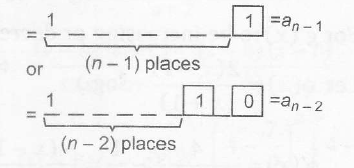Answer:
Option A
Explanation:
Since $a_{n}$ be the n-digit positive integer formed by the digits 0,1 or both such that no two consecutive digits are zero.
$b_{n}$=numbers which are ending with 1
$C_{n}$= number which are ending with 0
$\therefore$ $a_{n}=b_{n}+c_{n}$
i.e, $a_{n}$=1(0 or 1)...............(0 or 1)
$b_{n}=$1 (0 or 1) ........1
nth place
$c_{n}$=1(0 or 1) ......0
As $a_{n}=b_{n}+c_{n}$
i.e, $a_{n}=1$.................(1 or 0).

$\Rightarrow$ $a_{n}=a_{n-1}+a_{n-2}$
$\therefore$ $a_{17}=a_{16}+a_{15}$